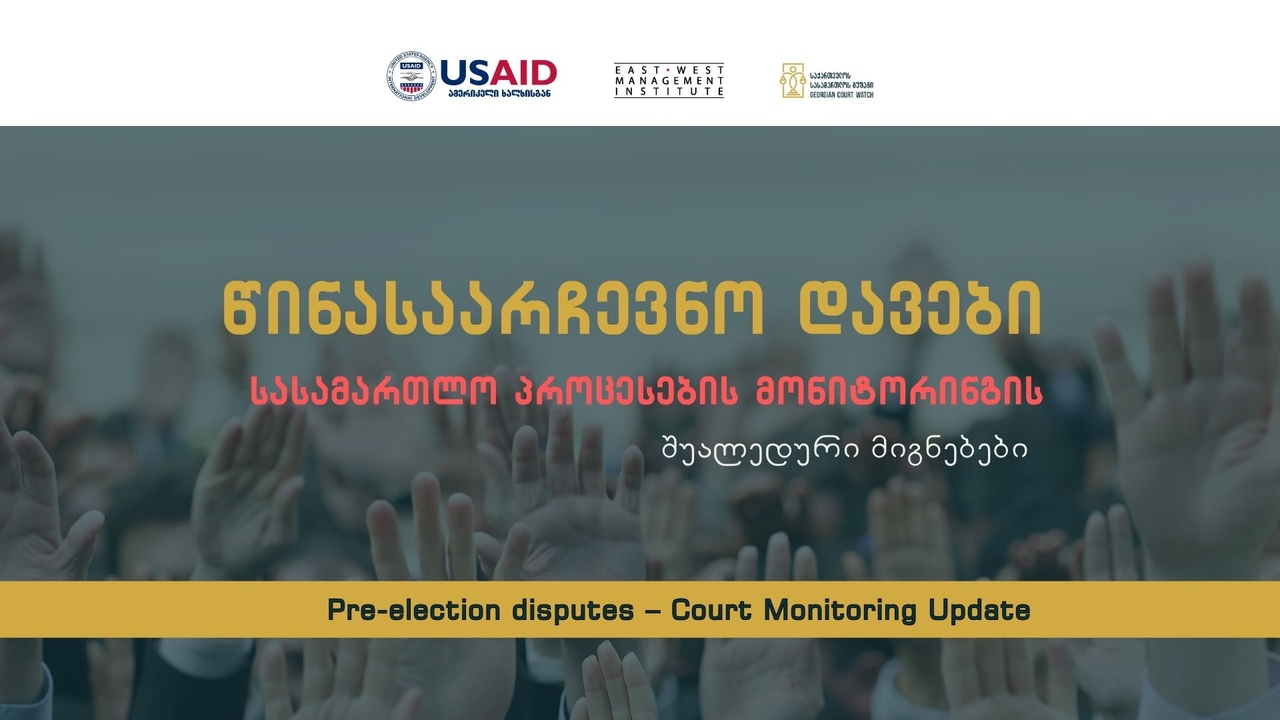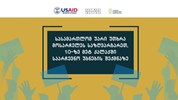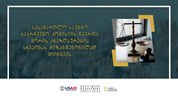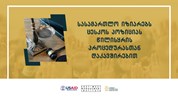Pre-election disputes – Court Monitoring Update

Period: 20 August - 20 October, 2024
Georgian Court Watch monitored the hearings of pre-election disputes in the courts. Thirty-three volunteer observers participated in the monitoring process. They monitored forty-three hearings in total from August 20 to October 20 (total of thirty-six cases). Majority of the monitored proceedings were held in Tbilisi City Court; The hearings were also observed in Batumi, Kutaisi, Rustavi, Poti, Bolnisi, Gori and Zugdidi District (City) Courts. More than 20 judges presided over pre-election proceedings.
The cases were mainly related to the distribution of functions of the election commission members in the precincts, the remuneration of the commission members, creation of election precincts abroad, placement of political advertisements on broadcaster air, use of administrative resources in the campaigns, and the flaws revealed in the lists of political parties.
- Sometimes, the schedule of pre-election dispute-related sessions was not published on the official website of the court (ecd.court.ge), six sessions (14%) out of forty-three were not mentioned in the schedule. Tbilisi Court of Appeals was a particularly problematic with this respect –this court almost never publishes information on the pre-election hearings. In one case a plaintiff who was present in the building was not notified about the start of the hearing. Consequently, the observer was not able to attend the session either.
- In several cases the scheduled and actual starting times of a hearing did not coincide, which is an important issue from the point of view of the court’s openness.
- In almost all cases, the judges upheld a position of the Election Administration (CEC) or the National Communication Commission. In some decisions the court did not review the main argument of the party, thus raising questions with respect to impartiality and competency of the judge.
- Additionally, during several proceedings, the judge did not treat the parties equally, addressed them rudely, or did not listen to them with equal attention. Furthermore, during one of the hearings, the judge posed questions that an observer perceived as prejudiced.
- Pre-election disputes were distributed among more than 20 judges, including judges (Zviad Gochashvili and Zviad Tsekvava) appointed to Tbilisi City Court recently, in October 2024. The competency of the newly assigned judges to handle pre-election cases is questionable. Especially, in the case of Tbilisi City Court Judge – Zviad Gochashvili who has taken a judicial exam and has also completed professional training in criminal law only.
- In General, the competencies of judges reviewing pre-election cases are hard to determine based on information published on the official webpage of the judicial system; the High School of Justice did not provide information to the Georgian Court Watch in response to the question on whether the judges were trained in the election-related dispute resolution.
- In several cases the judge did not provide justification for granting or denying the motion(s). In addition, in 19% of the monitored sessions, the judges appeared unprepared for the process, they did not appear as having detailed knowledge about the cases at hand. During one of the hearings in Tbilisi City Court, the judge was using a mobile phone, leaving the impression of not paying attention to the party speaking at that time.
- As far as the administration of proceedings is concerned, 35% of the monitored sessions started late. Eight out of them started with 30 minutes to one hour delay.
- Monitors also paid attention to the participants’ compliance with ethical standards during the sessions. In one of the hearings, the third party displayed a cynical attitude and made dismissive comments towards the party, however the judge did not react to this behavior.
- When announcing decisions during hearings, the judges did not mention international standards.
- Lastly, the Court Watch monitors also monitored the High Council of Justice. In this period the Council became increasingly inaccessible. Transparency of the judicial system is particularly important during the pre-election period; however, the Council does not publish decisions on the website and does not provide public information requested by the non-governmental organizations or other stakeholders.
The monitoring is carried out by the Georgian Court Watch, with the support of USAID Rule of Law Program. The program is implemented by the East-West Management Institute, with the financial support of the United States Agency for International Development (USAID). Georgian Court Watch bears full responsibility on the content of the document and the views expressed in it may not reflect the view of the East-West Management Institute and the United States Agency for International Development.

The court refused the plaintiff to open polling stations in 15 cities abroad

HCOJ

The court considers the salary difference between the members of the Precinct Election Commission appropriate































